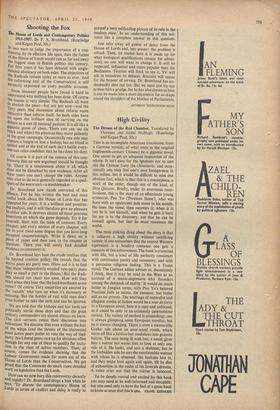High Civility
Tins is an incomplete American translation, from a German version, of what must in the original (eighteenth-century Chinese) be a gigantic novel. One seems to get an adequate impression of the whole. It isn't easy for the ignorant eye to sort out the Chinese from the chinoiserie, and occa- sionally one may feel one's own foreign-ness in this milieu, but it would be difficult to miss one obvious fact, which is that this is a masterpiece, a work of the order, though not of the kind, of Don Quixote. Briefly, under its enormous rami- fications, this is the story of an effeminate young aristocrat, Pao Yu (Precious Stone'), who was born with an opalescent jade stone in his mouth. He loses the stone, then recovers it; when it is lost he is 'not himself,' and when he gets it back his joy is in the discovery, not that he can be himself again, but that he must renounce the world.
The most striking thing about the story is that it achieves a high civility without sacrificing nature; if one remembers that the nearest Western equivalent is a Scuddry romance one gets a measure of this achievement. The book is crammed with life, but a kind of life perfectly consistent with continuous poetry and ceremony, and with a pervasive religious feeling. This is a Taoist novel. The German editor advises us, disastrously 1 think, that it may be read in the West as an account of a manic-depressive who 'founders among the demands of reality.' It would do much better in Jungian terms, with Pao Yu's beloved Precious Jade as anima, for instance; but better still as sui generis. The marriage of naturalist and allegoric modes of fiction would be a tour de force in a European novel; here it is easy and unforced, as it could be only in an extremely ceremonious society. The variety of method is astonishing; one is always glimpsing some European novelist, but he is always changing. There is even a memorable Gothic tale about an over-sexed youth, which starts off like a fabliau but modulates into genuine horror. The man being ill with lust, a monk gives him a mirror but warns him to look at only one side of it. He looks, and sees a skeleton; but in the forbidden side he sees the unattainable woman with whom he is obsessed. She beckons him in, and they make love again and again, till he dies of exhaustion in the midst of his feverish dreams. A voice cries out that the mirror is innocent.
To be deeply moved and excited by this book you may need to be well-informed and sinophile; but you need only to have the feel of a great book to know at once that this is one. FRANK KERMODE














































 Previous page
Previous page